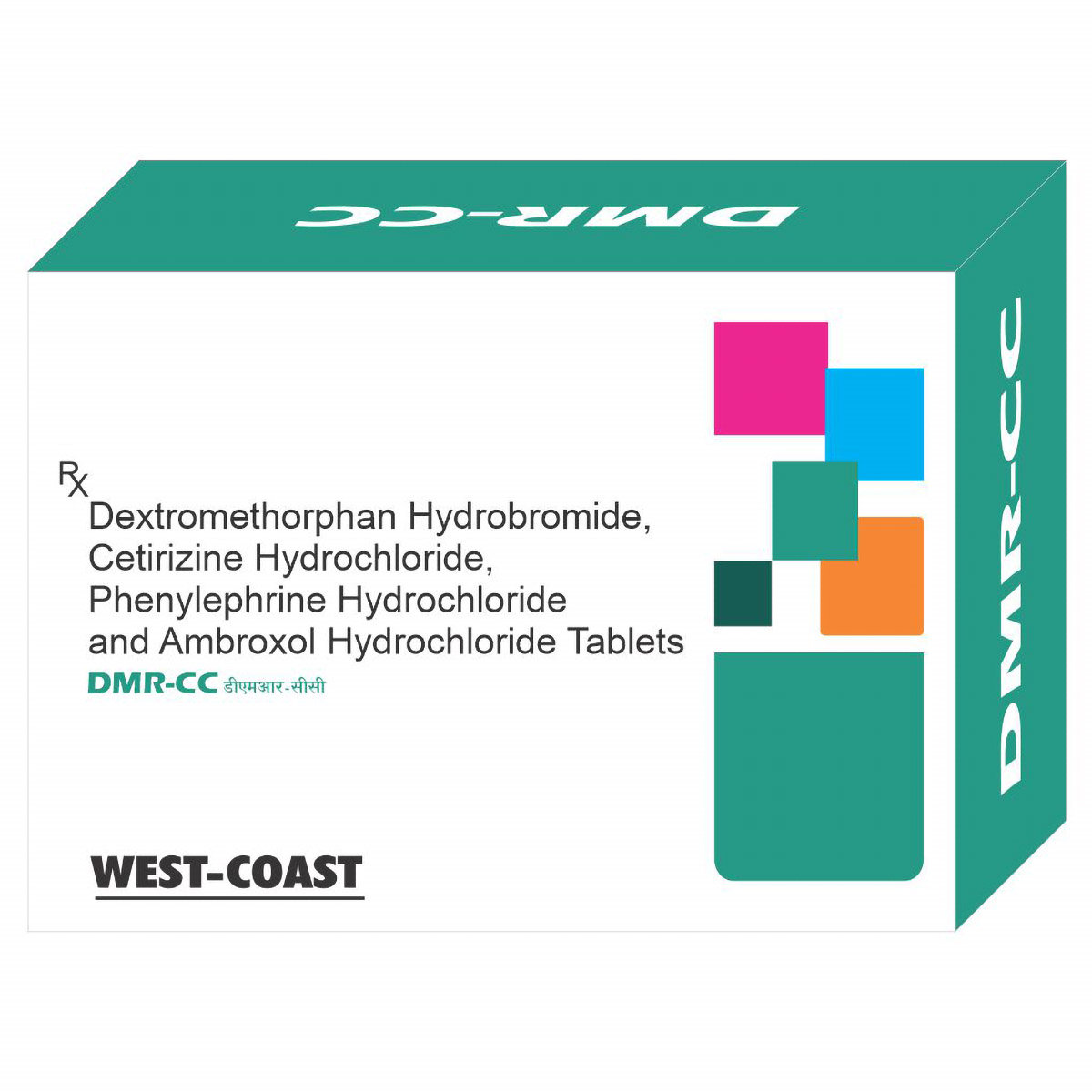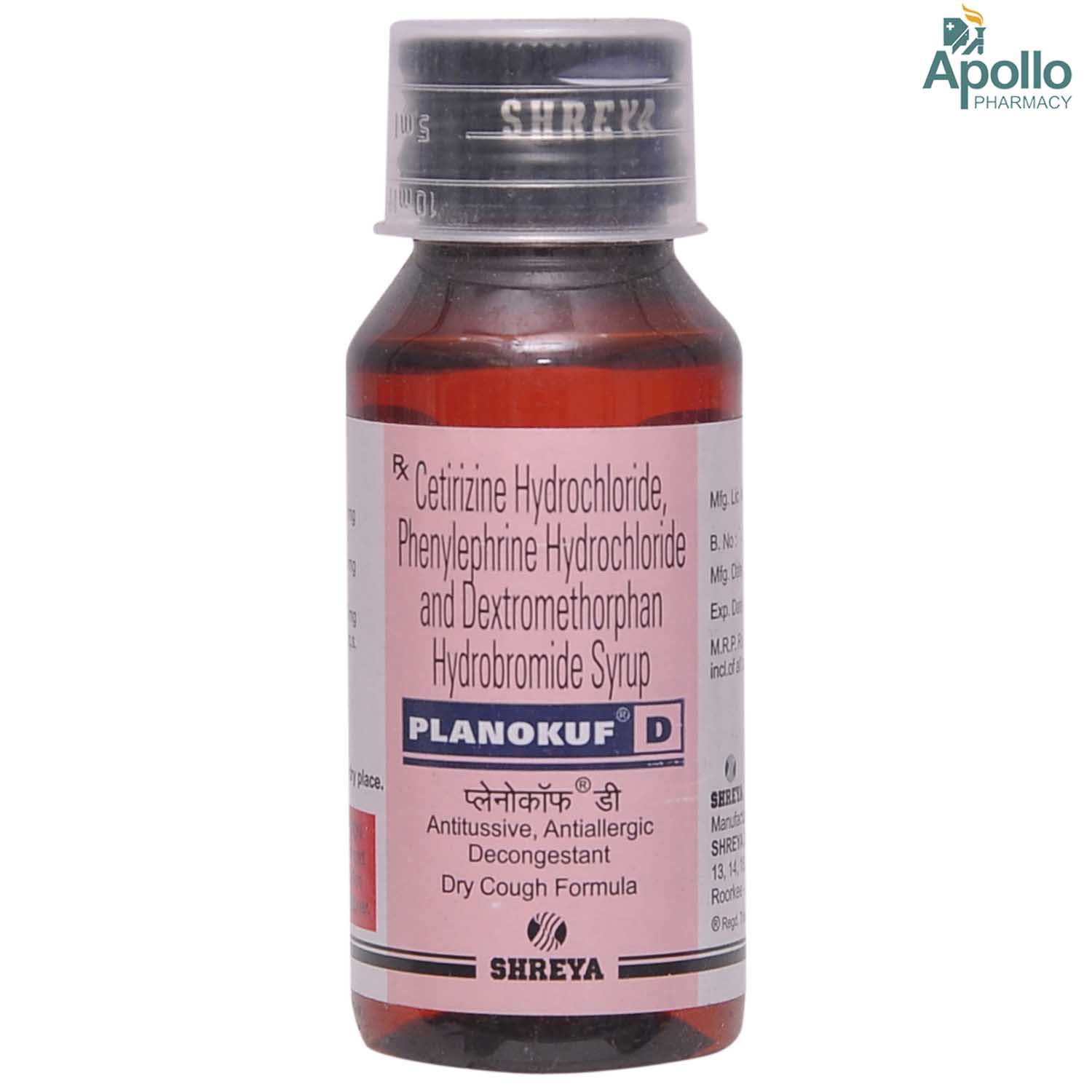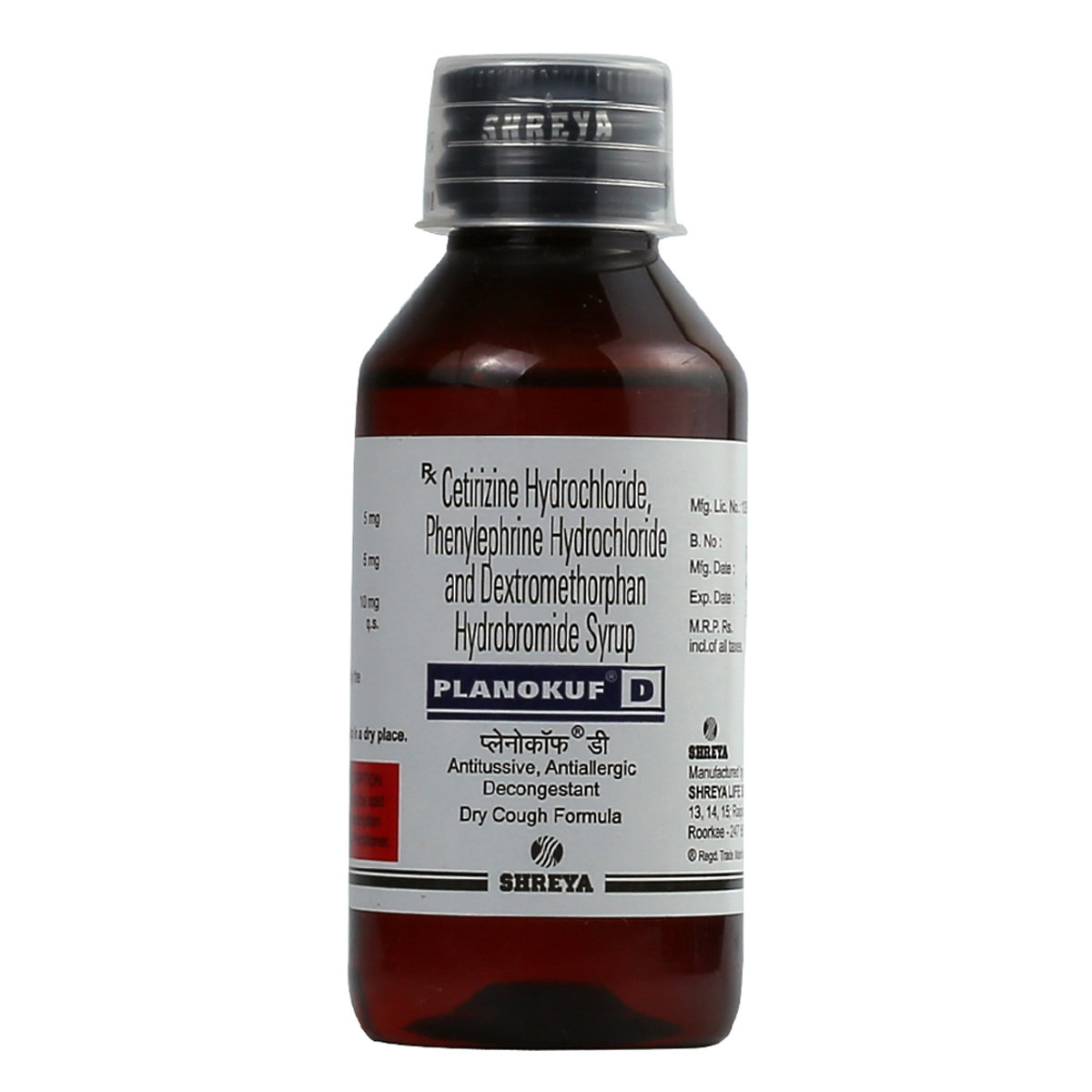Cetirizine+dextromethorphan+phenylephrine
About Cetirizine+dextromethorphan+phenylephrine
Cetirizine+dextromethorphan+phenylephrine belongs to the class of medications called 'cough and cold preparations,' primarily used to treat common cold and allergy symptoms, such as sneezing, a stuffy nose, dry cough, watery eyes, and throat irritation. A common cold occurs when your immune system reacts to a virus affecting the nose and throat (upper respiratory tract). An allergy is an immune system response to foreign elements (allergens), such as pollen or pet dander.
Cetirizine+dextromethorphan+phenylephrine contains Cetirizine, Dextromethorphan, and Phenylephrine. Cetirizine works by blocking the action of a natural substance (histamine) responsible for causing allergic reactions. Dextromethorphan works by blocking the cough receptor present in the brain, which is known to cause cough. Phenylephrine works by shrinking the blood vessels in the nasal passage, which helps ease discomfort and make breathing easier. Together, Cetirizine+dextromethorphan+phenylephrine helps relieve symptoms associated with common colds and allergies.
Your doctor will recommend the dose and duration of Cetirizine+dextromethorphan+phenylephrine based on your medical condition. Sometimes, you may experience common side effects such as drowsiness, lightheadedness, nervousness, dizziness, vomiting, nausea, stomach pain, and restlessness. Most of these side effects of Cetirizine+dextromethorphan+phenylephrine do not require medical attention and gradually resolve over time. However, if these side effects persist or worsen, please consult your doctor.
Before taking Cetirizine+dextromethorphan+phenylephrine, inform your doctor if you are allergic to any of its ingredients. Keep your doctor informed about your health conditions and medications to rule out any side effects or interactions. Tell your doctor if you are pregnant, planning to become pregnant, or breastfeeding before using this medication. Cetirizine+dextromethorphan+phenylephrine may cause dizziness and drowsiness, so avoid driving or operating machinery until you are fully awake and alert.
Uses of Cetirizine+dextromethorphan+phenylephrine
Medicinal Benefits
Cetirizine+dextromethorphan+phenylephrine belongs to the class of medications called 'cough and cold preparations,' primarily used to treat symptoms of the common cold and allergy, such as sneezing, a stuffy nose, dry cough, watery eyes, and throat irritation. It contains a combination of three medicines: Cetirizine, Dextromethorphan, and Phenylephrine. Cetirizine is an antihistamine/antiallergic medication that helps relieve cold or allergy symptoms by blocking the action of a natural substance (histamine) responsible for causing allergic reactions. Dextromethorphan is a cough suppressant that blocks the cough receptor present in the brain, which is known to cause cough. Phenylephrine is a nasal decongestant that helps ease a stuffy nose by shrinking the blood vessels in the nasal passage, thereby making breathing easier. Together, Cetirizine+dextromethorphan+phenylephrine effectively relieves symptoms associated with common colds or allergies.
Directions for Use
- Cetirizine+dextromethorphan+phenylephrine can be taken with or without food.
- Follow your doctor’s instructions on the dosage and timing of this medication to ensure safe and effective use.
- Measure the prescribed dose using a measuring cup and administer it orally.
- Shake the bottle well before each use. Avoid using regular household spoons, as they may not measure the dose correctly.
Storage
Side Effects of Cetirizine+dextromethorphan+phenylephrine
- Drowsiness
- Lightheadedness
- Nervousness
- Dizziness
- Vomiting
- Nausea
- Stomach pain
- Restlessness
Medicines Containing this Salt
View AllDrug Warnings
Do not take Cetirizine+dextromethorphan+phenylephrine if you are allergic to any of its ingredients. Keep your doctor informed about your health conditions and medications to rule out any side effects or interactions. Inform your doctor if you are currently taking or have recently stopped taking monoamine oxidase (MAO) inhibitors (isocarboxazid, phenelzine, or selegiline) within the past 14 days. Let your doctor know if you have medical conditions, such as phenylketonuria (increased phenylalanine levels in the blood), breathing problems (such as asthma, emphysema, or chronic bronchitis), high blood pressure, seizures, diabetes, thyroid disorders, an enlarged prostate (difficulty passing urine), or heart, liver, or kidney diseases. Consult your doctor if you are pregnant, planning to become pregnant, or breastfeeding before using this medication. Cetirizine+dextromethorphan+phenylephrine may cause dizziness and drowsiness, affecting your mental focus. Therefore, avoid driving or operating machinery until you are fully awake and alert.
Drug Interactions
Drug-Drug Interaction: Inform the doctor if you are taking monoamine oxidase (MAO) inhibitors (isocarboxazid, phenelzine, selegiline, tranylcypromine), antidepressants (alprazolam, amitriptyline), anti-arrhythmic medications (amiodarone, quinidine), opioid analgesics (codeine, morphine), anti-anxiety medications (fluoxetine, paroxetine), antifungals (terbinafine), blood thinners (warfarin), HIV medications (lopinavir, ritonavir), diabetes medications (metformin, glimepiride), antipsychotics (chlorpromazine, clozapine), and heart medications (digoxin).
Drug-Food Interaction: No interactions found.
Drug-Disease Interaction: Inform your doctor if you have medical conditions, such as phenylketonuria (increased phenylalanine levels in the blood), breathing problems (such as asthma, emphysema, or chronic bronchitis), high blood pressure, seizures, diabetes, thyroid disorders, an enlarged prostate (difficulty passing urine), or heart, liver, or kidney diseases before taking Cetirizine+dextromethorphan+phenylephrine.
Drug-Drug Interactions Checker List:
Safety Advice

Alcohol
cautionAvoid consumption of alcohol with Cetirizine+dextromethorphan+phenylephrine as it may increase drowsiness. Please consult a doctor before consuming alcohol with Cetirizine+dextromethorphan+phenylephrine.

Pregnancy
consult your doctorPlease consult your doctor if you are pregnant or planning to become pregnant before using Cetirizine+dextromethorphan+phenylephrine. Your doctor will prescribe this medication only if the benefits outweigh the risks.

Breast Feeding
consult your doctorPlease consult your doctor if you are breastfeeding before using Cetirizine+dextromethorphan+phenylephrine. Your doctor will prescribe this medication only if the benefits outweigh the risks.

Driving
cautionCetirizine+dextromethorphan+phenylephrine may cause drowsiness or dizziness in some people. Therefore, drive only if you are fully alert after taking Cetirizine+dextromethorphan+phenylephrine.

Liver
consult your doctorPlease consult the doctor if you have a history of liver diseases. Your doctor may need to adjust the dose of this medication.

Kidney
consult your doctorPlease consult the doctor if you have a history of kidney diseases. Your doctor may need to adjust the dose of this medication.

Children
consult your doctorAlways consult your doctor before giving Cetirizine+dextromethorphan+phenylephrine to children, as its safety and effectiveness have not been established in this age group.
Habit Forming
Diet & Lifestyle Advise
- Stay hydrated by drinking enough liquids at room temperature to alleviate cough, runny nose, and sneezing.
- Practice stress-relief techniques such as deep breathing or meditation to avoid stress on your immune system.
- Try to sleep 7-9 hours each night.
- Avoid contact with allergy-causing agents such as pollen and dust.
- Maintain personal hygiene and keep your surroundings clean to prevent the spread of germs.
- Eat foods rich in good bacteria, like yoghurt, to improve your overall health.
- Gargle with salt and warm water to relieve sore throat.
- Do not smoke cigarettes, as it may worsen your symptoms.
Special Advise
- Do not take Cetirizine+dextromethorphan+phenylephrine if you have taken any MAO inhibitor (antidepressant medications like Isocarboxazid, Tranylcypromine, Phenelzine, and Selegiline) within the past 14 days.
- Talk to your doctor if the symptoms do not improve even after taking Cetirizine+dextromethorphan+phenylephrine for 7 days.
Patients Concern
Disease/Condition Glossary
Common cold: A common cold is an infection caused by the rhinovirus affecting the nose and throat (upper respiratory tract). Symptoms may include a stuffy or runny nose, sore throat, congestion, headache, cough, body pain, sneezing, malaise (feeling unwell), and a low-grade fever.
Allergy: An allergy is an immune system response to foreign substances (allergens) typically not harmful to your body. Allergic condition varies from person to person. Some individuals may be allergic to certain foods, pollen, pet dander, or seasonal allergies like hay fever.
FAQs
Cetirizine+dextromethorphan+phenylephrine is primarily used to treat common cold and allergy symptoms, such as sneezing, a stuffy nose, dry cough, watery eyes, and throat irritation.
Cetirizine+dextromethorphan+phenylephrine contains a combination of three medicines: Cetirizine (an antihistamine/antiallergic), Dextromethorphan (a cough suppressant), and Phenylephrine (a nasal decongestant). Cetirizine works by blocking the action of a natural substance (histamine) responsible for causing allergic reactions. It helps relieve cold or allergy symptoms such as sneezing, a runny nose, watery eyes, itching, swelling, or congestion. Dextromethorphan works by blocking the cough receptor present in the brain, which is known to cause cough. Phenylephrine works by shrinking the blood vessels in the nasal passage, which helps ease discomfort and make breathing easier. Together, Cetirizine+dextromethorphan+phenylephrine helps relieve symptoms associated with common colds and allergies.
Cetirizine+dextromethorphan+phenylephrine may cause common side effects such as drowsiness, lightheadedness, nervousness, dizziness, vomiting, nausea, stomach pain, and restlessness. Most of these side effects of Cetirizine+dextromethorphan+phenylephrine do not require medical attention and gradually resolve over time. However, if these side effects persist or worsen, please consult your doctor.
Do not take Cetirizine+dextromethorphan+phenylephrine with any antidepressant medication, as it contains dextromethorphan and phenylephrine, which may cause unpleasant side effects or drug interaction. Cetirizine+dextromethorphan+phenylephrine should be taken at least 15 days after your last dose of anti-depressant medication, especially monoamine oxidase inhibitors (MAOIs).
Yes, Cetirizine+dextromethorphan+phenylephrine may cause drowsiness. However, it is not necessary for everyone taking Cetirizine+dextromethorphan+phenylephrine to experience this side effect. Avoid driving or operating machines if you feel drowsy after taking Cetirizine+dextromethorphan+phenylephrine.
Cetirizine+dextromethorphan+phenylephrine may be useful for treating allergic symptoms such as sneezing, watery eyes, a runny nose, or throat irritation. However, please consult your doctor to determine the underlying cause and the appropriate treatment for your allergic symptoms.
You are recommended to take Cetirizine+dextromethorphan+phenylephrine for as long as your doctor has prescribed it. However, if the symptoms persist or worsen even after one week of using Cetirizine+dextromethorphan+phenylephrine, please consult your doctor.






